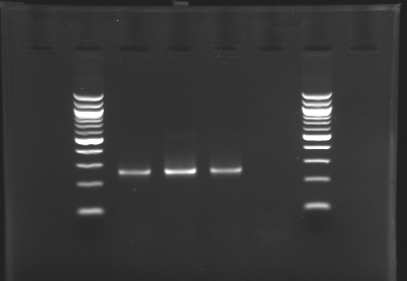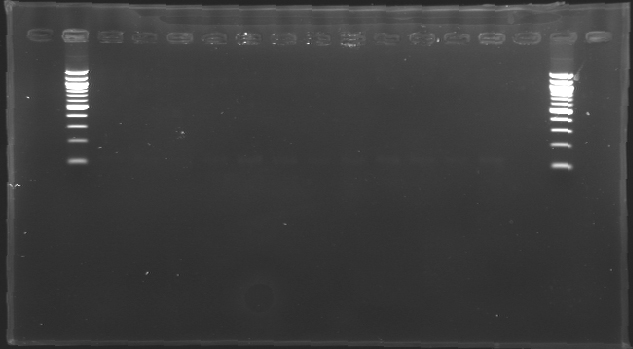From 2008.igem.org
|
← Yesterday ↓ Calendar ↑Tomorrow →
Extraction of pSB3K3 et E0240 in pSB1A2 plasmid from overnight bacteria culture using the QIAspin Miniprep Kit (QIAGEN) by QIACube.
- Carried out 2 times (2 tubes)
| name
| Biobrick
| plasmid
|
| MP142
| -
| pSB3K3
|
| MP143
| E0240
| pSB1A2
|
Amplification of Genes of interest (OmpR, EnvZ, FlhDC)
We performed PCR on to amplify the sequence in order to have enough amount of DNA to carry out the following of our experiments.
PCR Protocol
| Number
| Name
| Sequence
| Length
| Comments
|
| O126
| Gene-EnvZ-F
| GTTTCTTCGAATTCGCGGCCGCTTCTAGATGAGGCGATTGCGCTTCTCGCCAC
| 53
|
|
| O127
| Gene-EnvZ-R
| GTTTCTTCGAATTCGCGGCCGCTTCTAGTTATTACCCTTCTTTTGTCGTGCCCTGCGCC
| 59
|
|
| O131
| Gene-FlhC-R
| GTTTCTTCGAATTCGCGGCCGCTTCTAGTTATTAAACAGCCTGTACTCTCTGTTCATCC
| 59
|
|
| O132
| Gene-FlhD-F
| GTTTCTTCGAATTCGCGGCCGCTTCTAGATGCATACCTCCGAGTTGCTGAAAC
| 53
| Don't amplify the natural rbs of FlhD
|
| O138
| Gene-OmpR-F
| GTTTCTTCGAATTCGCGGCCGCTTCTAGATGCAAGAGAACTACAAGATTCTGG
| 53
|
|
| O139
| Gene-OmpR-R
| GTTTCTTCGAATTCGCGGCCGCTTCTAGTTATTATGCTTTAGAGCCGTCCGGTACAAAG
| 59
|
|
Protocol PCR
For each samples,
- Preparation of the templates :
--> Resuspend of 1 colony in 100µl of water.
1 µl dNTP
10 µl Buffer Phusion 5x
2,5 µl Oligo_F
2,5 µl Oligo_R
1µl template
1 µl Phusion
50 µl qsp H2O (33µl)
| Name
| Genes
| Oligo
| Templates
|
| PCR_127
| FlhDC
| O131_O132
| MG1655
|
| PCR_128
| OmpR
| O138_O139
| strain OmpR*
|
| PCR_129
| EnvZ
| O126_O127
| strain EnvZ*
|
| PCR_Control -
| -
| O126_O127
| Water
|
- Program PCR "Screening": Annealing 55°C - Time élongation 1'30" - Number cycle : 29
Electrophoresis Purification of PCR
When the PCR cycles were finished,
conditions :
- 10µl of ladder 1 kb (unlike 100 pb)
- 2 x 30µl of PCR products added with 10µl of loading Dye 6x
- migration ~30min at 100W on a 1,5% agarose gel.
Results of electrophoresis
gel 1 150px
gel 2 145px
| Name
| Promotor
| Gel
| Band
| Expected size
| Measured size
|
| PCR_124
| pFlgA
| 1
| 2-3
| 261 pb
| 300 pb
|
| PCR_125
| pFlgB
| 1
| 4-5
| 261 pb
| 300 pb
|
| PCR_126
| pFlhB
| 2
| 5-6
| 260 pb
| 300 pb
|
| PCR_127
| pFlhDC
| 1 & 2
| 7 & 2
| 446 pb
| 1,000 pb
|
==> Conclusion:
- After electrophoresis, the bands corresponding to the right amplification were excised and purified using the Promega protocol.
- Elution in 30 µL of buffer EB.
- Store at -20°C
Transformation results
| Name
| Description
| Antibio
| Number of colonies
| Number of red fluorescent colonies
|
| Ligation
|
| L128
| J61002-pFlgA
D136 (FV) - D132 (FI)
| Amp
| ~ 400
| 2
|
| L129
| J61002-pFlgB
D136 (FV) - D133 (FI)
| Amp
| 39
| 5
|
| L130
| J61002-pFlhB
D136 (FV) - D134 (FI)
| Amp
| ~ 1000
| 4 (but 3 are on the edge of the petri dishe)
|
| L131
| J61002-pFlhDC
D136 (FV) - D135 (FI)
| Amp
| 39
| 38
|
| Control
|
| Control 1
| D136
| Amp
| 0
| 0
|
| Positive control
| pUC19
| Amp
| 36
| 0
|
PCR Screening of Ligation Transformants
Use of 8 clones of Ligation transformants for screening PCR
| Border="1"
| Ligation
| Name
| n° clone
| fluorescence
|
| L128
| pFlgA
|
|
| OligoF_VF2 (O18)
| 1µl
| 10µM
|
| OligoR_VR (O19)
| 1µl
| 10µM
|
| water
| 23µl
|
Protocol of screening PCR
| Name
| Vol (µl)
| Concentration
|
| Quick Load
| 25µl
| 2X
|
| OligoF_VF2 (O18)
| 1µl
| 10µM
|
| OligoR_VR (O19)
| 1µl
| 10µM
|
| water
| 23µl
|
- 50µl of Mix PCR by tube/clone
- one toothpick of each clone's colony by tube
- Program : Annealing 55°C - Time élongation 1'30" - Number cycle : 29
Conditions of electrophoresis
- 10µl of ladder 100 pb
- 10µl of screening PCR
- migration ~30min at 100W on 1,5% gel
Results for L100
L100= D110 + D130 = RBS-tetR-ECFP-Ter 




Preparation of the newly ammplified promoters
Electrophoresis of the PCR products made yesterday

Standart PCR to amplify pflgA, pflgB and pflhB(Gel1)

PCR with gradient to amplify pflhDC(Gel2)
Electrophoresis settings
- Gel : 1.5 % agar
- 3µL template DNA
- 10µL QuickLoad DNA ladder 100 bp
| Name
| Promotor
| Gel
| Band
| Expected size
| Measured size
|
| PCR_124
| pFlgA
| 1
| 2
| 261 pb
| 250 pb
|
| PCR_125
| pFlgB
| 1
| 3
| 261 pb
| 250 pb
|
| PCR_126
| pFlhB
| 1
| 4
| 260 pb
| 250 pb
|
| PCR_127
| pFlhDC
| 2
| 2 to 13
| 446 pb
| nothing
|
Results
- We have no results for pflhDC, wo don't know yet where is the problem. We will try with other conditions! (yet undetermined)
- Concerning pflhB, pflgA and pflgB, the protocol seems to be very operational: we always have great results !
![]()
![]()
![]()
![]()
![]()
 "
"


